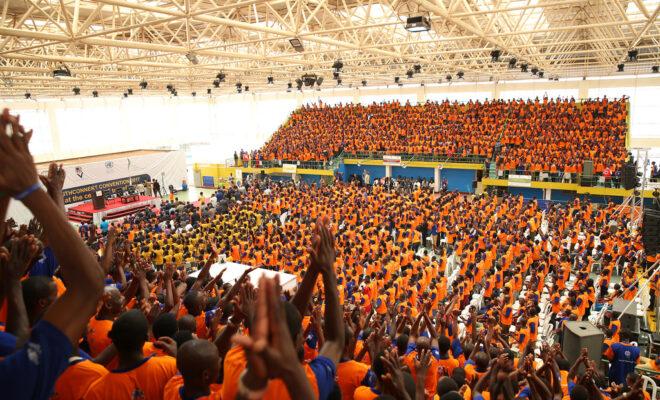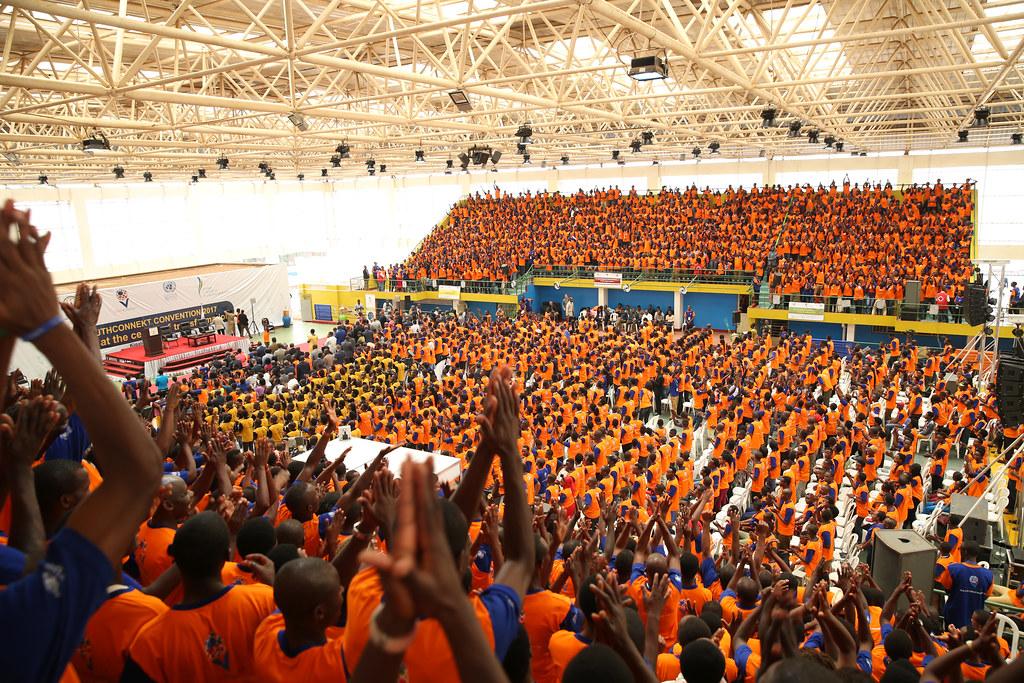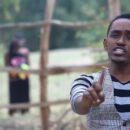The disappearance of half a million young people from Rwanda’s stats

Analysis of Rwanda’s survey data reveals interesting findings about the country’s youth, including a mysterious anomaly.

A youth convention in Rwanda in 2017. Credit: Paul Kagame.
For many years, both the Rwandan government and international donors have invested heavily in development programmes aimed at Rwanda’s youth. But how are young people in the country actually doing?
The official data tells us some interesting things about education, employment, and poverty among this demographic. It also reveals a curious anomaly. Of the 3.437 million Rwandans who were 10- 24 years old in 2005/6, just over one in six had seemingly disappeared by the time of the 2016/17 surveys. There is some variation between numbers of people in other age brackets too, but none nearly as significant as the 580,000 missing young people.
Table 1: Distribution of population by age group on basis of EICV sample extrapolations
| EICV2 | 2005/6 | EICV3 | 2010/11 | EICV5 | 2016/17 | 2005/6 – 2016/17 |
| Groups | People | Groups | People | Groups | People | Change |
| Total | 9,491,000 | Total | 10,762,000 | Total | 11,893,000 | |
| 0-4 | 1,709,000 | |||||
| 0-4 | 1,630,000 | 5-9 | 1,530,000 | |||
| 0-4 | 1,561,000 | 5-9 | 1,572,000 | 10-14 | 1,626,000 | |
| 5-9 | 1,331,000 | 10-14 | 1,404,000 | 15-19 | 1,250,000 | |
| 10-14 | 1,232,000 | 15-19 | 1,205,000 | 20-24 | 1,052,000 | -180,000 |
| 15-19 | 1,203,000 | 20-24 | 1,026,000 | 25-29 | 920,000 | -283,000 |
| 20-24 | 1,002,000 | 25-29 | 885,000 | 30-34 | 885,000 | -117,000 |
| 25-29 | 687,000 | 30-34 | 648,000 | 35-39 | 724,000 | |
| 30-34 | 492,000 | 35-39 | 504,000 | 40-44 | 502,000 | |
| 35-39 | 390,000 | 40-44 | 414,000 | 45-49 | 407,000 | |
| 40-44 | 400,000 | 45-49 | 369,000 | 50-54 | 333,000 | |
| 45-49 | 342,000 | 50-54 | 335,000 | 55-59 | 312,000 | |
| 50-54 | 266,000 | 55-59 | 249,000 | 60-64 | 225,000 | |
| 55-59 | 170,000 | 60-64 | 160,000 | 65-… | 418,000 | |
| 60-64 | 123,000 | 65-… | 361,000 | |||
| 65-… | 292,000 |
Source: http://www.statistics.gov.rw/. Note: The age groups have been organised to show progression from age groups through the surveys. The comparison is not exact as the age groups are defined in 5-year ranges but the surveys EICV2 and EICV5 were 11 years apart.
Let us start with what we learn about the youth who are included in the statistics. According to Rwanda’s Fifth Integrated Household Living Survey (EICV5), conducted in 2016/17, the signs for Rwandan youth are rather positive.
On education, the report finds that over 95% of youth have attended school and that 85% are literate. This literacy rate is significantly higher than sub-Saharan Africa’s average of around 75%. These encouraging statistics may be explained by the introduction of free compulsory basic education in 2009, initially for 9 years of schooling but later increased to 12 years.
Since then, enrolment rates have significantly increased though concerns have been raised regarding the quality of this education. A 2018 World Bank report pointed to a “highly unfavourable pattern of progression in early grades” and high drop out rates. It warned that “most children in primary school do not acquire age-appropriate literacy and numeracy skills”, partly due to challenges associated with Rwanda’s switch from Kinyarwanda and French to English as the language of instruction.
On employment, the EICV5 survey points to a high activity rate among youth. 77% are registered as “working”, 16% studying, and just 2.7%, seeking employment. However, it also finds that 58% of youth are working less than 35 hours per week, which might be considered “under-employed”.
Our own qualitative research suggests that young people in Rwanda face several difficulties in finding employment. Youth face reduced access to land, increased competition for jobs, and scarce stable opportunities. Additionally, while policymakers encourage young people to become entrepreneurial citizens who take the initiative to create their own jobs, the reality is that few have sufficient access to capital to start a business.
On poverty, the 2016/17 survey finds that Rwanda’s youth is in a better position on average than the overall population. About 30% of youth lives below the poverty line and 11% below the extreme poverty line, compared to 38% and 16% respectively of the total population.
The missing half million
The above trends give an interesting insight into the situation facing young people in Rwanda, though they may not be fully accurate given that one-sixth of the 10-24-year-olds in the 2005/6 survey had disappeared by the 2016/7 report.
What happened to those 580,000 young people?
The first and most extreme hypothesis is that these young people died. There is zero evidence of this, however, as there have been no enormous disasters or conflicts that would lead to such a remarkable level of loss.
The second is that these young people left the country. Our own (forthcoming) qualitative research found that significant numbers of young Rwandans migrate, either seasonally or permanently to Uganda, the DRC, and Burundi, seeking jobs in agriculture and the tertiary sector. Faced with land scarcity and lack of alternative sources of income, high levels of migration in and out of Rwanda have become a key feature of young people’s life. However, while official records show that out-migration is higher than in-migration, the difference is unlikely to account for 580,000 people.
A third hypothesis is that the missing individuals are in Rwanda but were not picked up by the surveys due to difficulties caused by internal migration. The EICV5 reported that one-fifth of 16-30-year-olds had moved in the preceding five years. Our own research has found that many young people move home for job opportunities or end up perpetually on the move in search of temporary employment. Our findings indicate that most of these circular movements are often driven by necessity rather than seeking the “best opportunities”. This mobility and the fact that many young people are frequently absent from “home” yet not registered elsewhere could lead to them being missed out in official statistics.
There may be other hypotheses worth exploring too, but ultimately, the disappearance of one out of six Rwandan youth remains a statistical mystery. What is less mysterious is that Rwandan youth face many challenges, which have only been added to by the COVID-19 pandemic. While there have been several recent initiatives specifically oriented towards youth’s well-being in Rwanda, there is still a great need for further substantial efforts to enable young Rwandans to cope with the lack of capital, unemployment, and inadequate access to economic opportunities.







My own experience of being part of a national census and MDG survey (in Kigali and a village) showed me that people who live in the household but who were not born in the umudugudu are unlikely to be counted (esp if their circumstances would negatively impact findings). This would account for MANY youth who are domestic workers.
Second, I found similar anomalies in post-94 stats, with a huge gender gap between male/female pop (I forget which age cohort/year/gender). It looked like 100,000+ babies (it involved post-94 births) went missing. I still don’t know what explains this??
western point of view, this none sense
This information poses a challenge to all great lakes countries, to see that they also conduct similar surveys,These surveys establish demographic data in line with urban/rural development dynamics.
Every rwandan knows at least one person who disappeared. It’s very common that disappears in the hand of the infamous security apparatus and of so many branches of it.